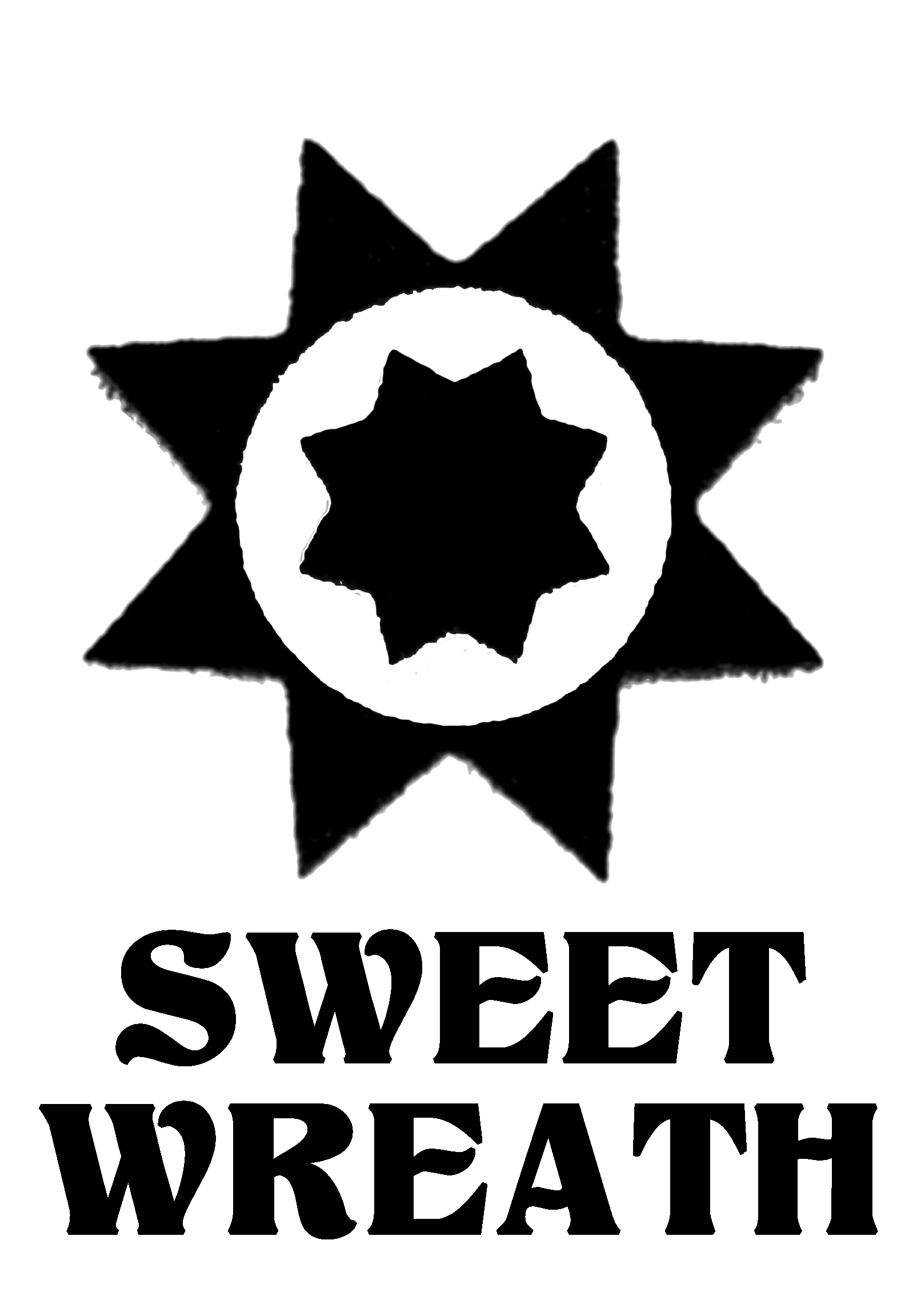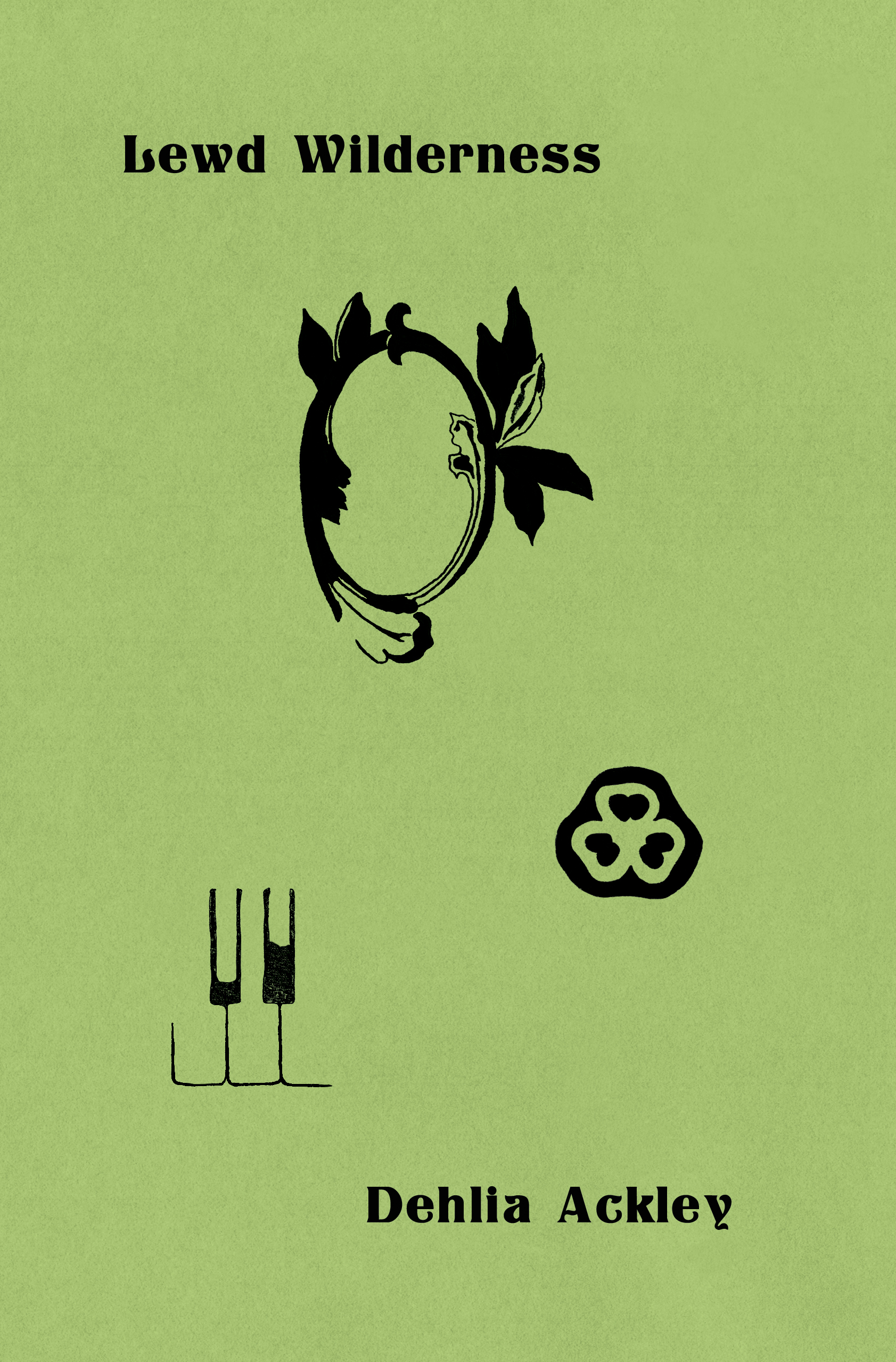
Dehlia Ackley - Lewd Wilderness
First Edition Paperback
93 pages, 26 photographs
In Lewd Wilderness, Dehlia Ackley explores poetic expression in three parts, her original poetry, erasure poetry, and film photography. Her poems in Bloomt from Shadows are glances of observations that use play and mystery to lure the reader into activating their own experiences and imagination for interpretation. The words create a place for wandering in the mind, just like a wilderness does for the body. Grate is an erasure of Jean Cocteau’s Grace Notes, which explores a modality of writing without the act of writing, revealing a text within a text, to create a new mystery out of an existing mystery. The process of erasure becomes like sculpture, hewing away at a block of text until a latent subject emerges, like a swan out of a slab of marble. In the last section of the book, Photographs, Dehlia captures through happenstance the anomalies of nature and experience. The images notate textures or monolithic shapes, like visual signposts on a path into the unknown.
“Dehlia is as true an artist as they come. She looks at the beautiful, the tragic, the horrific, the lost, and she doesn’t look away. Her poems are honest, humorous, devastating, serious and casual, timeless and of now, subtle and not. To see the world through her developed lens is a gift and very exciting.” -Erica Schreiner
Dehlia Ackley is a poet, artist, and photographer living in Portland, Oregon with her husband, Caspar Sonnet, and two cats.
Sweet Wreath Speaks No. 20 Interview :
What range of time were you working on the material for Lewd Wilderness? What does the title imply to you?
The poems in the first part of the book Bloomt from Shadows I started in 2018. I only know this because I had a book that I had been working on since 2015 and sadly lost it due to a software update on my old MacBook. It took a few months before I began writing again. The second part Grate I created after I had seen some of Jean Cocteau’s films, in particular The Blood of a Poet, which is absolutely visually stunning and inspiring. I went on to find one of his books The Grace Notes and I immediately knew that I wanted to continue some type of dialogue with his prose poem style in it and so I reread it with the intent to create erasure poetry.
The title Lewd Wilderness was chosen by scanning at the poems in the book and finding a line that stood out, something that might catch the attention of others. In regards to writing that line, my poetry mentor, Marvin Bell, said that “music always wins” in poetry. And there could have been any number of words that I could’ve used to describe wilderness but lewd seems appropriate in a musical way and it’s a love poem for my husband.
The book has a very organic flow....it almost seems like one long poem. Do you write one poem or page at a time or is material whittled down from larger sections of writing?
My writing process is that I have to write by hand first in a notebook, which involves a combination of writing down my recent experiences and word association type exercises, which are attempts at surprising myself. Then I take the best moments from the notebook and type them up in a word document, which is where I think it starts taking the shape of a poem. Editing is my favorite part and I see how these poems feel condensed and whittled from a larger part. My tendency is to ask every word if it really needs to be in the poem, and the answer is usually no, it doesn’t. However not titling each poem was something that I developed over time.
The idea of erasure poetry is really interesting, but may be a process some people are unfamiliar with. Can you describe how you first encountered this practice and how you've used it?
I encountered erasure in one of my first poetry classes where we were exploring different types of poetic forms. We were shown Jen Bervin’s Nets, where she erases Shakespeare’s sonnets, and I was instantly captivated by the concept. The first time I erased a whole book was Bill Callahan’s Letters to Emma Bowlcut, which is a beautiful book and I really destroyed it, it’s almost embarrassing to think about now. Not to say that I didn’t do that again with Grate. Ha! I believe that there’s a real value in creating something where the origin isn’t ourselves all the time but instead an interaction or dialogue with other artists.
Who are some of your favorite poets and authors?
Two of my favorites poets are Robert Lax and e.e. cummings. Robert Lax could’ve achieved the end of poetry with his skill and desire to find a universal truth in his poems through hypnotic repetition of nouns and colors. And no one writes a love poem like e.e. cummings, utterly stunning and experimental, totally ahead of his time. I also find a lot of specialness in Gertrude Stein, Joshua Beckman, and Anne Carson.
I'm really drawn to concepts that jump out of the book. Ideas that are quickly stated and then immediately the words are lyrically moving onto other images.
Lines like "myth of ownership" or "lack has its sweetness" or "romantic antithesis of guilt". Could you talk further about any of these ideas?
I think one of the reasons why I like to add a lot of space in my poems is because I do make statements that are not grounded in image but in idea. I want the reader to feel free to keep thinking without leading them into a narrow place of one interpretation. I’ll endeavor to explore the line “lack has its sweetness” which is from a poem that references my father who died when I was seven years old. Throughout my life, I’ve moved through so many feelings about loss, especially as I lost more friends and family members with time. There are moments that will remind me of them, for example I associate deers with my father, and when I encounter a deer it almost opens the door to another realm outside of the physical world. In fact, I visited his grave a few years ago, and whenever I visit his grave I write a letter to leave on his tombstone. While I was writing the letter, a deer appeared and slowly walked through the cemetery. There’s a sweetness to that experience. That’s just one of many ways that I find meaning in that line.
A lot of your photographs seem to be taken in remote places. Were all the photos in the book taken in Oregon, or the broader Pacific Northwest?
Are there specific places that really struck you? Places you return to frequently?
Yes, most of the photos were taken in Washington, Oregon, and California. I think a photo from NYC snuck in there from a trip visiting my friend, Erica. My husband, Caspar, and I like to go on adventures where he’ll collect field recordings and I take pictures. We visit places that aren’t too far outside of Portland where we live so it’s kind of convenient that way. We definitely have places that we return to frequently like the Oregon Coast. The weather seems to provide a perpetual renewal so there’s always something new to photograph no matter how often we go. Remote places tend to provide me with what I like taking pictures of, such as unusual happenings in nature and abandoned structures. I like skeletal remains as well. Who doesn’t.
Is there a poetry "scene" in Portland?
There’s quite a literary scene in Portland. It’s really great! Some of the places that standout for exceptional poetry events and a great selection of books are Passages Books and Mother Foucault’s Bookshop.
What other projects are you currently working on or planning at the moment?
Recently, I’ve been painting more and trying my hand at ceramics. I really enjoy the tactile experience it provides. I’m still trying to figure it out. However my goal with poetry is to start another book soon now that Sweet Wreath provided a home for what I’d written the last few years. It’s exciting to release it in order to make space for something new.
First Edition Paperback
93 pages, 26 photographs
In Lewd Wilderness, Dehlia Ackley explores poetic expression in three parts, her original poetry, erasure poetry, and film photography. Her poems in Bloomt from Shadows are glances of observations that use play and mystery to lure the reader into activating their own experiences and imagination for interpretation. The words create a place for wandering in the mind, just like a wilderness does for the body. Grate is an erasure of Jean Cocteau’s Grace Notes, which explores a modality of writing without the act of writing, revealing a text within a text, to create a new mystery out of an existing mystery. The process of erasure becomes like sculpture, hewing away at a block of text until a latent subject emerges, like a swan out of a slab of marble. In the last section of the book, Photographs, Dehlia captures through happenstance the anomalies of nature and experience. The images notate textures or monolithic shapes, like visual signposts on a path into the unknown.
“Dehlia is as true an artist as they come. She looks at the beautiful, the tragic, the horrific, the lost, and she doesn’t look away. Her poems are honest, humorous, devastating, serious and casual, timeless and of now, subtle and not. To see the world through her developed lens is a gift and very exciting.” -Erica Schreiner
Dehlia Ackley is a poet, artist, and photographer living in Portland, Oregon with her husband, Caspar Sonnet, and two cats.
Sweet Wreath Speaks No. 20 Interview :
What range of time were you working on the material for Lewd Wilderness? What does the title imply to you?
The poems in the first part of the book Bloomt from Shadows I started in 2018. I only know this because I had a book that I had been working on since 2015 and sadly lost it due to a software update on my old MacBook. It took a few months before I began writing again. The second part Grate I created after I had seen some of Jean Cocteau’s films, in particular The Blood of a Poet, which is absolutely visually stunning and inspiring. I went on to find one of his books The Grace Notes and I immediately knew that I wanted to continue some type of dialogue with his prose poem style in it and so I reread it with the intent to create erasure poetry.
The title Lewd Wilderness was chosen by scanning at the poems in the book and finding a line that stood out, something that might catch the attention of others. In regards to writing that line, my poetry mentor, Marvin Bell, said that “music always wins” in poetry. And there could have been any number of words that I could’ve used to describe wilderness but lewd seems appropriate in a musical way and it’s a love poem for my husband.
The book has a very organic flow....it almost seems like one long poem. Do you write one poem or page at a time or is material whittled down from larger sections of writing?
My writing process is that I have to write by hand first in a notebook, which involves a combination of writing down my recent experiences and word association type exercises, which are attempts at surprising myself. Then I take the best moments from the notebook and type them up in a word document, which is where I think it starts taking the shape of a poem. Editing is my favorite part and I see how these poems feel condensed and whittled from a larger part. My tendency is to ask every word if it really needs to be in the poem, and the answer is usually no, it doesn’t. However not titling each poem was something that I developed over time.
The idea of erasure poetry is really interesting, but may be a process some people are unfamiliar with. Can you describe how you first encountered this practice and how you've used it?
I encountered erasure in one of my first poetry classes where we were exploring different types of poetic forms. We were shown Jen Bervin’s Nets, where she erases Shakespeare’s sonnets, and I was instantly captivated by the concept. The first time I erased a whole book was Bill Callahan’s Letters to Emma Bowlcut, which is a beautiful book and I really destroyed it, it’s almost embarrassing to think about now. Not to say that I didn’t do that again with Grate. Ha! I believe that there’s a real value in creating something where the origin isn’t ourselves all the time but instead an interaction or dialogue with other artists.
Who are some of your favorite poets and authors?
Two of my favorites poets are Robert Lax and e.e. cummings. Robert Lax could’ve achieved the end of poetry with his skill and desire to find a universal truth in his poems through hypnotic repetition of nouns and colors. And no one writes a love poem like e.e. cummings, utterly stunning and experimental, totally ahead of his time. I also find a lot of specialness in Gertrude Stein, Joshua Beckman, and Anne Carson.
I'm really drawn to concepts that jump out of the book. Ideas that are quickly stated and then immediately the words are lyrically moving onto other images.
Lines like "myth of ownership" or "lack has its sweetness" or "romantic antithesis of guilt". Could you talk further about any of these ideas?
I think one of the reasons why I like to add a lot of space in my poems is because I do make statements that are not grounded in image but in idea. I want the reader to feel free to keep thinking without leading them into a narrow place of one interpretation. I’ll endeavor to explore the line “lack has its sweetness” which is from a poem that references my father who died when I was seven years old. Throughout my life, I’ve moved through so many feelings about loss, especially as I lost more friends and family members with time. There are moments that will remind me of them, for example I associate deers with my father, and when I encounter a deer it almost opens the door to another realm outside of the physical world. In fact, I visited his grave a few years ago, and whenever I visit his grave I write a letter to leave on his tombstone. While I was writing the letter, a deer appeared and slowly walked through the cemetery. There’s a sweetness to that experience. That’s just one of many ways that I find meaning in that line.
A lot of your photographs seem to be taken in remote places. Were all the photos in the book taken in Oregon, or the broader Pacific Northwest?
Are there specific places that really struck you? Places you return to frequently?
Yes, most of the photos were taken in Washington, Oregon, and California. I think a photo from NYC snuck in there from a trip visiting my friend, Erica. My husband, Caspar, and I like to go on adventures where he’ll collect field recordings and I take pictures. We visit places that aren’t too far outside of Portland where we live so it’s kind of convenient that way. We definitely have places that we return to frequently like the Oregon Coast. The weather seems to provide a perpetual renewal so there’s always something new to photograph no matter how often we go. Remote places tend to provide me with what I like taking pictures of, such as unusual happenings in nature and abandoned structures. I like skeletal remains as well. Who doesn’t.
Is there a poetry "scene" in Portland?
There’s quite a literary scene in Portland. It’s really great! Some of the places that standout for exceptional poetry events and a great selection of books are Passages Books and Mother Foucault’s Bookshop.
What other projects are you currently working on or planning at the moment?
Recently, I’ve been painting more and trying my hand at ceramics. I really enjoy the tactile experience it provides. I’m still trying to figure it out. However my goal with poetry is to start another book soon now that Sweet Wreath provided a home for what I’d written the last few years. It’s exciting to release it in order to make space for something new.
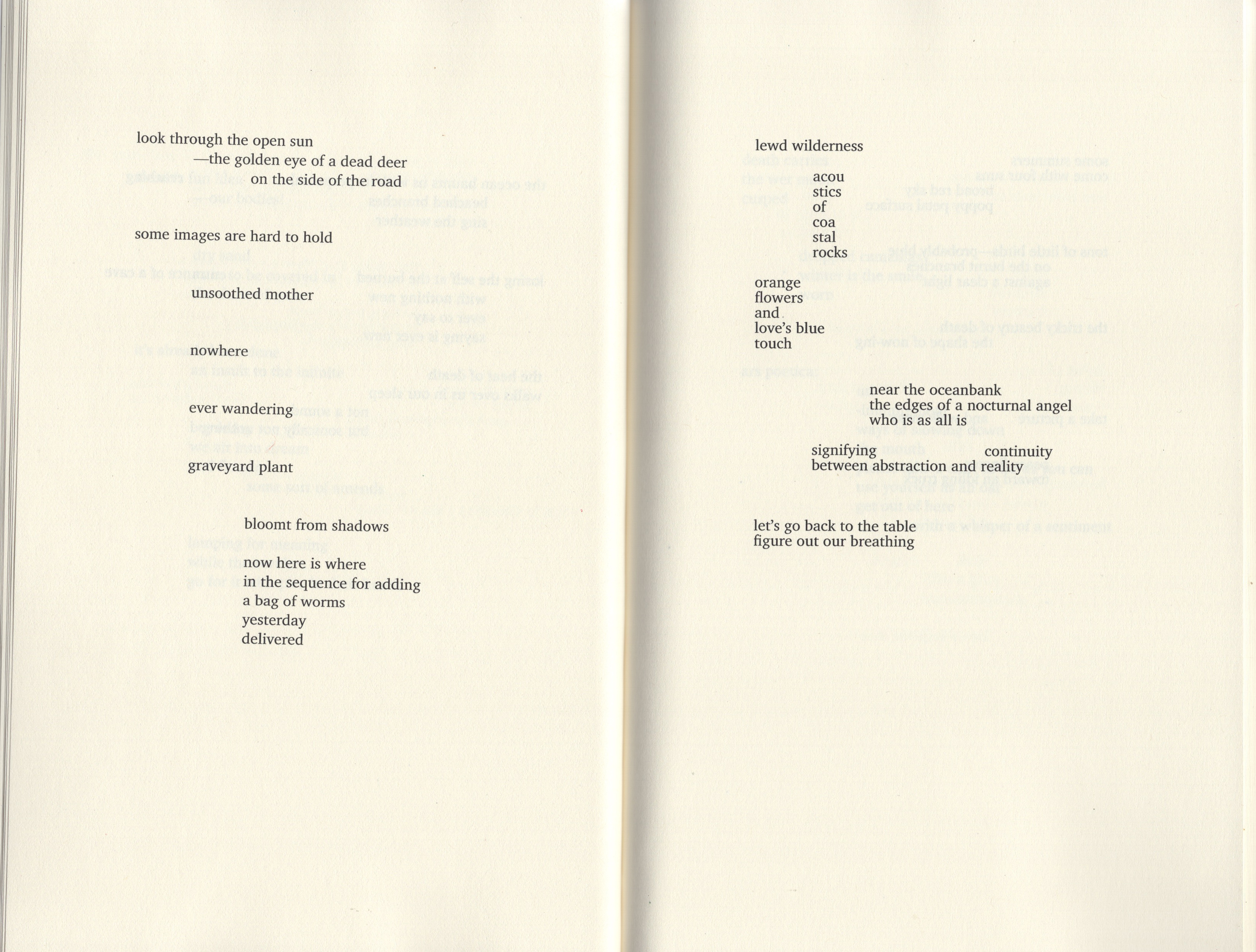
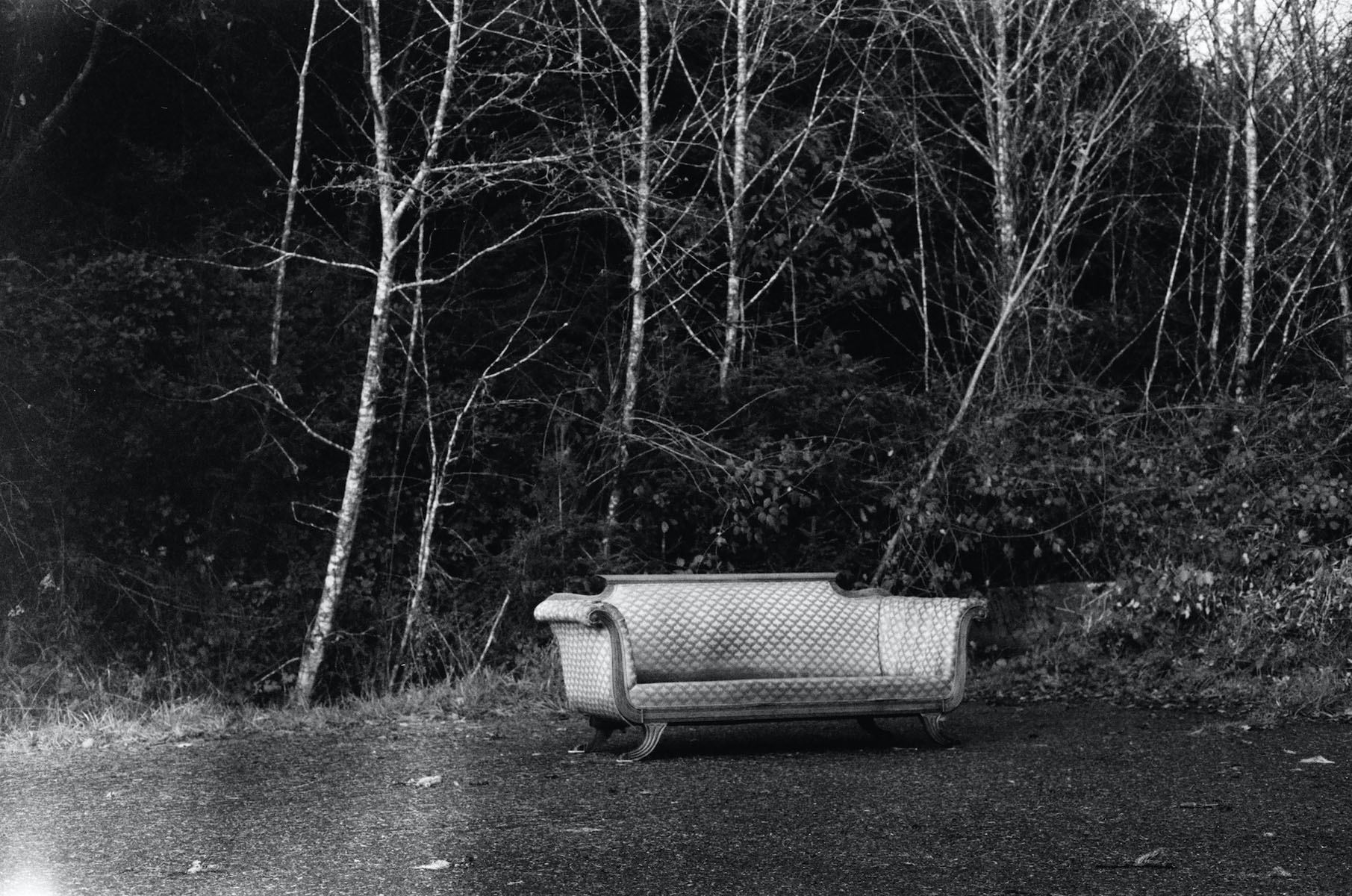
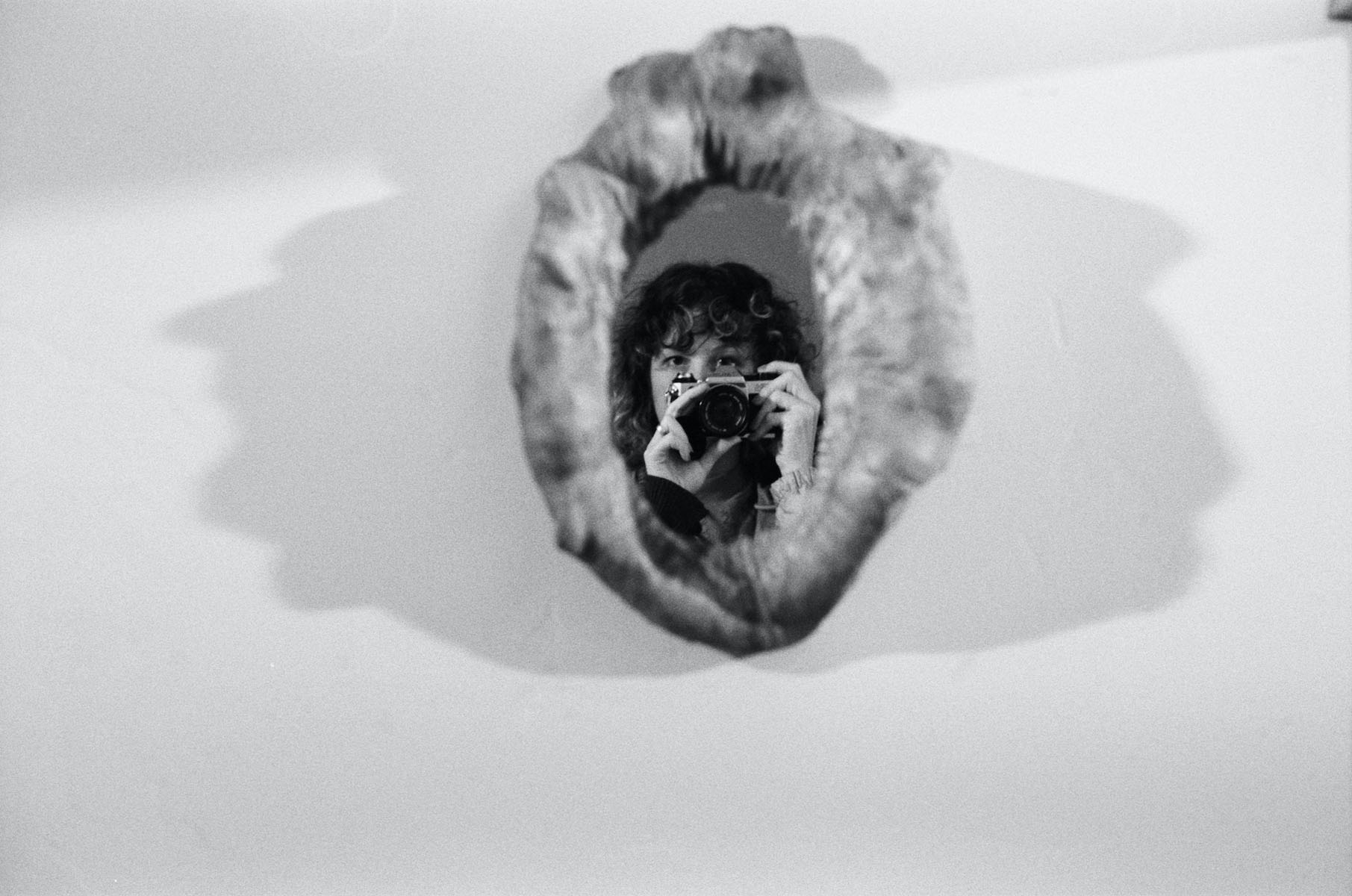
__________________________________________________________________________________________
